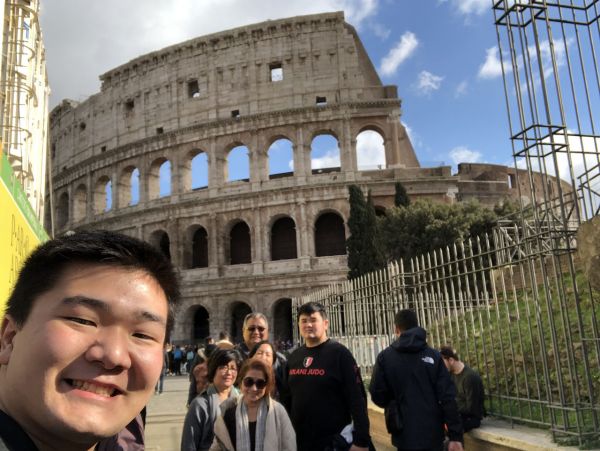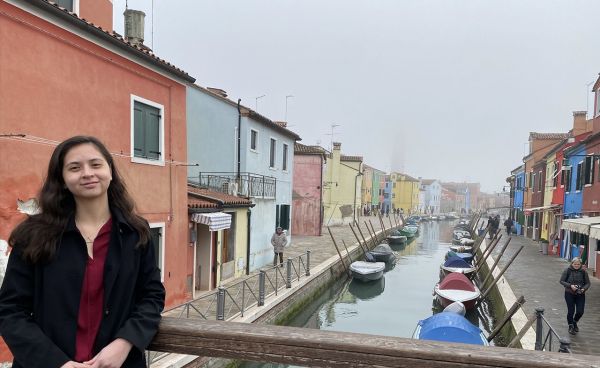When Dane Yamashiro (EE/M.S. EE 4th Year) was a young boy, one Christmas he asked Santa Claus not for the latest toy or electronic gadget, but for cheese, he was so in love with mozzarella, cheddar, and just about any other variety of the dairy delectable. Little did Yamashiro know that a couple of decades later, his cheese gift would be delivered in Geneva, Switzerland—the unofficial fondue capital of the world—along with another present: the vision that he could contribute to sustainability projects that could impact the planet.
Yamashiro had the opportunity to visit Switzerland as well as six other countries this past spring semester when he participated in the Ecole Nationale Supérieure de l’Electronique (ENSEA) French AMerican Exchange (FAME) program, which gave him and 19 other university students from across the country two weeks of time to travel after six weeks of study. Kaitlyn Graves (EE/M.S. EE 4th Year) also participated in the program. What none of the students could anticipate, however, was that then-burgeoning pandemic would send them packing back to the United States to conclude their program remotely after their first eight-week session.
Illinois Institute of Technology is one of nine partner universities in the ENSEA FAME program, which gives students a study abroad experience and coursework at ENSEA, a selective and specialized school in Cergy-Pontoise, France, that produces engineers in electrical engineering, computer science, and telecommunications. Yamashiro and Graves had their five courses—three electrical engineering, one mathematics, and one French-language humanities—approved by Jafar Saniie, chair of the Department of Electrical and Computer Engineering and Filmer Chair Professor, in advance of the trip.
“The courses at Illinois Tech seem to be more theory-based while all our electrical engineering FAME courses were paired with labs,” says Graves, whose mother is an Illinois Tech mechanical engineering alumna. “Hands-on work is stressed.”
While the work was challenging, Graves acknowledged that faculty knew that the American students were also there to experience living in another country and along with the French students, were both very helpful and accommodating. Each Thursday was a free day in the FAME program. As Cergy-Pontoise is a suburb of Paris, Yamashiro spent his day with new friends among the Parisian markets, restaurants, and cafes. On Tuesday evenings he hosted a Bible study and cooked dinner for members. While the students enjoyed nonalcoholic drinks and Latin dance lessons at the campus hangout, Le Cave, both Graves and Yamashiro admitted that the trip totally brought out their inner foodie.
“Produce was marked by country of origin—eggplant from Spain, grapes from Italy. Our dorm was close to a grocery store, restaurants, a pharmacy, and a bakery that I went to every day for croissants, baguettes, tartines, or eclairs,” he says, while Graves notes that going to the bakery to buy a daily baguette was part of daily life for tourists and citizens alike.
Graves had just returned from her two-week break in Venice and northern Italy and Yamashiro from a whirlwind trip with five family members touring sites such as Stonehenge, Vatican City, and Buckingham Palace, when both were informed that European borders would be closing because of the pandemic and that they had five days to make it back home, which for Yamashiro was Honolulu, Hawaii. He barely had time to catch his breath, when he had to plunge into completing his ENSEA FAME academic requirements—nocturnally.
“That was really tough, because there is a 12-hour time difference between Europe and Hawaii,” he explains. “My classes went from 10 p.m. to 9 a.m., and twice a week I had lab from 1 a.m. to 5 a.m. It was a harsh experience once I came back home. In Europe, it was the greatest!”
Yamashiro says that his trip high point was in Geneva, savoring cheese and chocolate with Graves and other students—and walking up to the entrance of the Palais des Nations United Nations office surrounded by the multicolored flags representing member countries.
“Seeing that opened possibilities in my mind about where I could live. I thought about how policy change takes place there and wondered if I could expand into climate change policy in my career,” he says, noting that he came to Illinois Tech because of his interests in renewable energy and microgrids, and because Chicago is such a diverse city. “Seeing how this all can be applied on a global scale is even more impactful.”
For now, Graves has resumed her internship at the Naval Surface Warfare Center in Crane, Indiana, but is looking forward to returning one day to Europe and intends to make travel a regular part of her future career path.
“Other students should take advantage of this opportunity,” she says about the ENSEA FAME program. “It was definitely cool to live in a different country, not just visit it.”
Next year Yamashiro will begin doing research on power markets and smart energy devices for microgrids with Illinois Tech Professor Zuyi Li, associate director of the Robert W. Galvin Center for Electricity Innovation. It is all part of his plan to shift his efforts from the local to the global.
“Hopefully, I can start implementing my worldwide vision of helping along clean energy and fighting climate change,” says Yamashiro.



